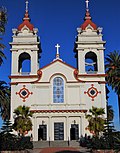Portuguese Americans
Portuguese Americans (Portuguese: [português-americanos] Error: {{Lang}}: text has italic markup (help)), also known as Luso-Americans (luso-americanos), are citizens and residents of the United States who are connected to the country of Portugal by birth, ancestry, or citizenship.
português-americanos luso-americanos | |
|---|---|
| Total population | |
| Portuguese ancestry 1,373,147 (2015) 0.4% of the US population[1] | |
| Regions with significant populations | |
| California, Florida, Hawaii, Massachusetts, New York, New Jersey, and Rhode Island, among others. | |
| Languages | |
| Religion | |
| Predominantly Roman Catholic | |
| Related ethnic groups | |
|
Portuguese Americans Media
- Touro Synagogue, Newport, Rhode Island.jpg
Touro Synagogue in Newport, Rhode Island was founded by Portuguese Jews in 1763.
- Cabrillo National Monument (Loki30) (cropped).jpg
The Cabrillo National Monument in San Diego honors João Rodrigues Cabrilho, the first European to reach California in 1542
- PeterFrancisco.jpg
Peter Francisco was an Azorean born patriot of the American Revolutionary War.
Renowned composer and conductor John Philip Sousa
Portuguese National Church, in the Little Portugal neighborhood of San Jose, California
Benjamin N. Cardozo served on the United States Supreme Court in the 1930's.
The Ukulele is one of the most notable Portuguese contributions to American culture, originally brought by Madeiran immigrants to Hawaii.
Portuguese Centenniel Park in Hayward, California
- John dos Passos.jpg
Renowned 20th-century novelist John Dos Passos
- Portuguese1346.gif
Portuguese ancestry in the United States in the 2000 census
References
- ↑ "2015 American Community Survey 1-Year Estimates: Selected Social Characteristics in the United States". United States Census Bureau. 2015. Retrieved 2017-01-30.



